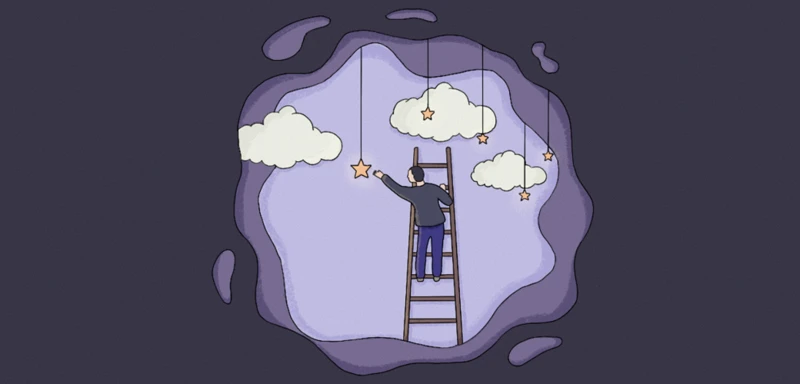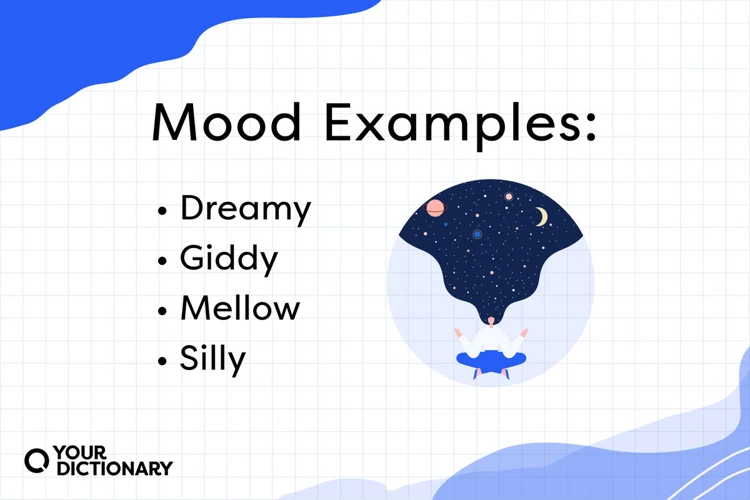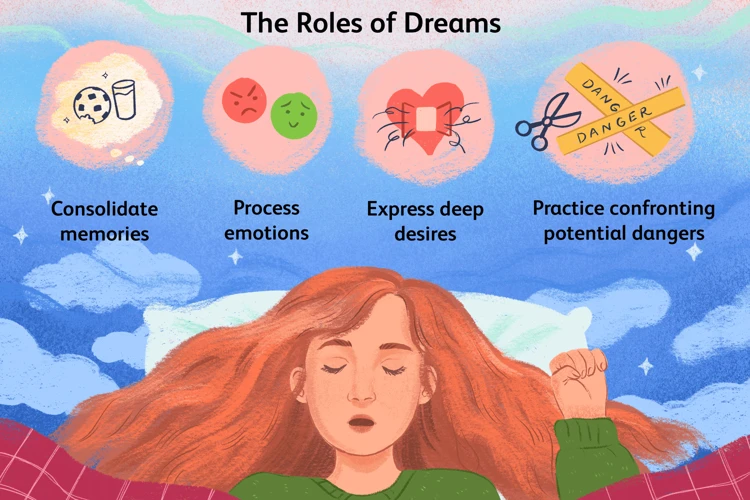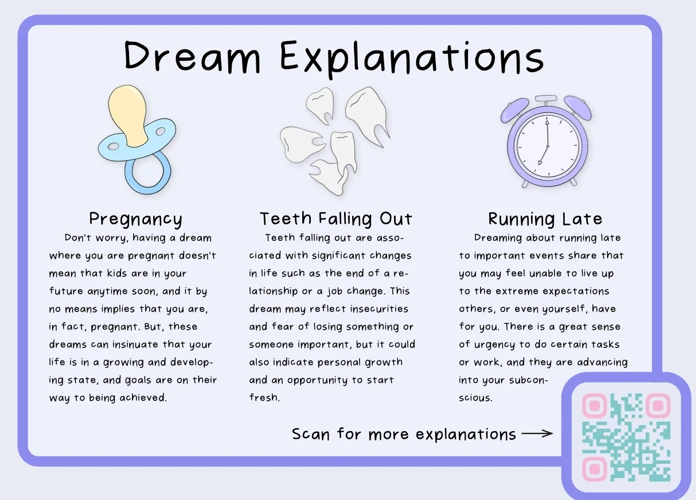Dreams have long been a subject of fascination and intrigue, offering a glimpse into the hidden recesses of the human mind. Throughout history, people have sought to unravel the enigma of dreams and understand their significance. One intriguing aspect of dream analysis is the role of fear and anxiety. These emotions often play a central role in our dreams, providing valuable insights into our subconscious thoughts and emotions. By delving into the connection between fear, anxiety, and dream analysis, we can gain a deeper understanding of ourselves and unravel the mysteries of our innermost thoughts and fears.
The Significance of Dreams

Dreams hold a significant place in the realm of human psychology and personal exploration. They serve as a doorway to our subconscious, offering a unique platform for understanding our fears, desires, and emotions. An individual’s dreams can be seen as a reflection of their unconscious mind, allowing them to explore and process unresolved conflicts, past experiences, and unexpressed emotions. Dream analysis enables individuals to uncover hidden truths about themselves, gaining insights that can aid in personal growth and healing. By delving into dream content, symbols, and themes, individuals can decipher the underlying emotional patterns that shape their thoughts, behaviors, and relationships in their waking lives. Understanding the significance of dreams opens a window into the subconscious mind, unlocking a wealth of self-knowledge and the potential for personal transformation.
Dreams often contain vivid depictions of fears and anxieties that might not be readily apparent in our waking lives. By examining these emotions within the context of dreams, we can gain a deeper understanding of their underlying causes and psychological impact. Fear can serve as a powerful reflective element within dream analysis, providing valuable insights into our subconscious fears, traumas, and insecurities. When we experience fear in our dreams, it can be an indicator of unresolved issues or anxieties that we may need to address in our waking lives. These dreams act as mirrors, reflecting our innermost fears and allowing us to confront and process them in a safe and symbolic environment. Fear in dreams can manifest in various forms, such as being chased, threatened, or confronted by something terrifying. Each of these scenarios may represent different aspects of our fears, requiring individual interpretation and analysis to fully comprehend their significance. The symbolic interpretation of fear in dreams is key to unraveling its hidden messages and unlocking personal growth. By recognizing and exploring the symbolic meaning behind our fears, we can gain a deeper understanding of ourselves and the challenges we face in our waking lives. This exploration of fear in dream analysis can lead to personal empowerment and the ability to overcome obstacles that hinder personal growth and fulfillment.
The Connection Between Emotions and Dreams

The connection between emotions and dreams is a profound and intricate aspect of human psychology. Dreams serve as a canvas for our emotions, allowing us to process and express feelings that may be unconscious or repressed in our waking lives. Emotions can heavily influence the content, tone, and symbolism of our dreams, offering a window into our innermost thoughts and desires. By examining the emotional landscape of our dreams, we can unravel the intricate relationship between our emotional state and the images and narratives that unfold during sleep. Dream analysis enables individuals to explore the emotional patterns that shape their dreams, providing valuable insights into their psychological well-being and overall emotional health. Through the practice of journaling and examining our dreams, we can identify recurring themes and symbols that are associated with specific emotions. This process allows us to gain a deeper understanding of how our emotions manifest and influence our dream experiences. The symbolism within dreams provides a rich tapestry for exploring and understanding our emotions on a subconscious level. By deciphering the symbolic representations within our dreams, we can tap into the underlying emotions and their significance. This connection between emotions and dreams is a testament to the powerful influence that our inner emotional landscape has on our dream experiences. Understanding and decoding this connection offers opportunities for personal growth, self-reflection, and emotional healing. By embracing the intricate web of emotions within our dreams, we can gain a deeper understanding of ourselves and navigate the complexities of our emotional lives with greater insight and awareness.
The Role of Fear in Dream Analysis

The role of fear in dream analysis is multifaceted and holds great significance in understanding our subconscious mind. Fear serves as a reflective element within dreams, uncovering deep-seated anxieties and unresolved emotional conflicts. When we experience fear in our dreams, it is essential to examine the context and symbolism surrounding it. One technique is to keep a dream journal or record dreams to identify patterns and recurring fears. This can provide valuable insights into the underlying causes of our fears and the emotions associated with them, helping us to confront and address them in our waking lives. Understanding the symbolic interpretation of fear in dreams is crucial as well. Fear in dreams often takes on various forms, such as being chased, attacked, or facing a threatening situation. Each of these scenarios carries its own symbolic meaning and may represent different aspects of our fears and vulnerabilities. Exploring the symbolism behind these fears can reveal deeper truths about ourselves, our past experiences, and our unconscious desires. By analyzing and understanding the role of fear in dream analysis, we can gain clarity and self-awareness, enabling personal growth and emotional healing. If you want to learn more about dream journals and emotional patterns, you can refer to our article on dream journaling and emotional patterns.
Fear as a Reflective Element
Fear plays a crucial role as a reflective element in dream analysis. When fear emerges in our dreams, it serves as a mirror that reflects our deepest fears, anxieties, and unresolved emotions. Each individual’s experience of fear in dreams is unique, and it can manifest in various forms and scenarios. For example, being chased by an unknown entity can represent a fear of being pursued or overwhelmed. The feeling of being trapped or unable to escape can symbolize a sense of confinement or powerlessness in certain aspects of our lives. These symbolic representations of fear hold valuable insights into our subconscious mind, offering a glimpse into the inner workings of our psyche.
By recognizing fear as a reflective element in dream analysis, we can begin to unravel the underlying emotions and experiences that contribute to our fears. Through examination and interpretation of dream symbols, we can uncover the hidden meanings behind our fears and gain a deeper understanding of their origins. This process allows us to confront and address our fears in a supportive and nonthreatening environment. Understanding fear as a reflective element in dream analysis empowers individuals to confront their fears head-on, promoting personal growth and self-awareness. It provides an opportunity to explore the root causes of our fears, heal past wounds, and develop strategies to overcome them in our waking lives. By embracing fear as a catalyst for personal transformation, we can navigate through life with greater resilience, courage, and authenticity.
The Symbolic Interpretation of Fear in Dreams
In dream analysis, fear holds symbolic significance that goes beyond its literal interpretation. Each element of fear in a dream carries its own symbolic meaning, providing valuable insights into the inner workings of our subconscious mind. For example, being chased in a dream may symbolize a sense of being pursued or hunted by some aspect of our lives that we are trying to avoid or escape (source). This could represent unresolved conflicts, repressed emotions, or situations that we feel overwhelmed by in our waking lives. Similarly, being confronted by something terrifying in a dream might symbolize a deep-rooted fear that requires our attention and understanding. By interpreting and analyzing the symbolic representation of fear in our dreams, we can uncover the underlying emotions, experiences, or fears that are influencing our subconscious mind. Identifying and understanding these symbols allows us to make connections between our dream world and our waking reality, shedding light on areas of our lives that may require exploration or resolution. Dream symbols are highly personal and can vary from person to person, so it is important to consider one’s own associations and emotional responses when interpreting the symbolic meaning of fear in dreams (source). Utilizing tools such as dream dictionaries or engaging in self-reflection can aid in this process of uncovering the deeper symbolism behind fear in dreams. Through the symbolic interpretation of fear, dream analysis becomes a transformative journey of self-discovery and emotional growth.
The Role of Anxiety in Dream Analysis

Anxiety plays a significant role in dream analysis, providing valuable insights into our inner conflicts and emotional struggles. Dreams act as a platform for the manifestation of our anxieties, offering a symbolic representation of our deepest fears and worries. When anxiety appears in our dreams, it often symbolizes unresolved issues and unexpressed emotions that are causing inner turmoil. These dream scenarios allow us to explore the root causes of our anxiety and gain a better understanding of the underlying conflicts within ourselves. By analyzing the symbolism and themes in these anxiety-driven dreams, we can uncover hidden messages and gain clarity about the areas of our lives that are causing us distress. For example, dreams about being late for an important event might reflect the anxiety we feel about time management or the fear of missing out on opportunities. Similarly, dreams about being unprepared for a test might represent the pressure we feel to perform and meet expectations. By delving into the symbolic representation of anxiety in dreams, we can gain valuable insights into our subconscious concerns and work towards resolving them in our waking lives. Dream analysis allows us to explore the roots of our anxieties, identify triggers, and develop strategies to manage and overcome them. Through this process, we can achieve a greater sense of emotional well-being and personal growth, ultimately leading to a more fulfilling and balanced life.
Anxiety as a Manifestation of Inner Conflicts
Anxiety, like fear, plays a significant role in dream analysis, providing insight into our inner conflicts and unresolved issues. When anxiety appears in our dreams, it often represents the manifestation of internal conflicts or unresolved emotions that we may be grappling with. These conflicts can arise from various sources, such as conflicting desires, moral dilemmas, or unexpressed emotions. Dreams serve as a symbolic platform for these conflicts to surface, allowing us to explore and process them in a safe and controlled environment. In this way, anxiety in dreams acts as a reflection of our inner turmoil and provides clues about the areas in our lives that require attention and resolution.
One common manifestation of anxiety in dreams is the theme of being overwhelmed or unable to cope with a particular situation. For example, dreaming about being late for an important event or feeling unprepared for a test can symbolize the anxieties we face in our waking lives. These scenarios may be indicative of feelings of inadequacy, fear of failure, or the pressure to meet certain expectations. By examining the context and emotions associated with these dreams, we can gain insights into the underlying conflicts and fears that contribute to our anxiety.
Another way anxiety manifests in dreams is through recurring situations or events that provoke a sense of unease or discomfort. For instance, recurring dreams about being trapped in an elevator or being lost in a maze can signify a lack of direction or a feeling of being stuck in a particular aspect of our lives. These dreams may point to unresolved conflicts and the need to find a way to navigate through challenging situations. Exploring the symbolic representation of these recurring scenarios can help us identify the root causes of our anxiety and develop strategies for resolving them in our waking lives.
Anxiety in dream analysis acts as a manifestation of our inner conflicts and unresolved issues. It provides us with an opportunity to explore and process these conflicts symbolically, ultimately aiding in personal growth and resolution. By delving into the context, emotions, and symbolism associated with anxiety in our dreams, we can gain valuable insights into our subconscious mind and work towards finding peace and balance in our waking lives.
Anxiety’s Symbolic Representation in Dreams
Anxiety, much like fear, plays a significant role in dream analysis. It can manifest in dreams as a reflection of our inner conflicts and unresolved tensions. Anxiety is often represented symbolically in dreams, offering insights into our subconscious worries and anxieties. These symbolic representations can take various forms, and their interpretation requires a deep understanding of the individual’s unique experiences and personal symbolism. For example, dreaming about being trapped or unable to escape may symbolize feelings of being overwhelmed or constrained in one’s waking life. Falling from heights in a dream can represent a sense of losing control or a fear of failure. These symbolic representations serve as metaphors for the anxieties and concerns that individuals may be grappling with. By exploring and deciphering these symbols, individuals can gain a clearer understanding of the root causes of their anxiety and work towards resolving or managing them in their waking life. Dream analysis provides a powerful tool for uncovering the symbolic representation of anxiety, helping individuals to identify and address their inner conflicts and emotional distress.
Techniques for Analyzing Fear and Anxiety in Dreams

Analyzing fear and anxiety in dreams requires specific techniques to unravel their meaning and gain insights into our subconscious. One effective method is journaling and dream recording. Keeping a dream journal allows individuals to document their dreams immediately upon waking, capturing details, emotions, and any associated fears or anxieties. The act of writing down dreams helps to solidify the memory and provides a valuable resource for later analysis. By reviewing dream entries over time, patterns and recurring themes related to fear and anxiety may emerge. This analysis can provide valuable information about the underlying causes of these emotions and offer guidance for personal growth.
Another technique for analyzing fear and anxiety in dreams is exploring personal associations. This involves examining the emotions, symbols, and scenarios presented in the dream and connecting them to personal experiences and feelings. Reflecting on how the dream elements relate to one’s waking life can provide important insights into the source of fear or anxiety. For example, a dream about being trapped in a confined space may symbolize feelings of being stuck or restricted in a particular area of life. Understanding these personal associations can shed light on the underlying fears or anxieties being represented in the dream.
Seeking guidance from a professional can also be an effective technique for analyzing fear and anxiety in dreams. Psychotherapists and dream analysts are trained to interpret dreams and can provide valuable insight and guidance in understanding the significance of fear and anxiety in dreams. Their expertise can help uncover hidden meanings, offer perspective on recurring themes, and provide tools for personal growth and healing. Collaborating with a professional can bring a deeper level of understanding and clarity to the analysis of fear and anxiety in dreams.
By utilizing these techniques, individuals can gain a greater understanding of the role of fear and anxiety in their dreams. This understanding can support personal growth, provide insights into unresolved emotional conflicts, and offer guidance for navigating fears and anxieties in both dreams and waking life.
Journaling and Dream Recording
Journaling and dream recording are powerful techniques for analyzing fear and anxiety in dreams. Keeping a dream journal allows individuals to document their dreams immediately upon waking, preserving the details and emotions felt during the dream state. By recording dreams consistently, patterns and themes may emerge, providing valuable insights into the recurring fears and anxieties that manifest in our dreams. When journaling dreams, it’s important to include as many details as possible, such as the setting, characters, emotions, and any significant events or symbols. This level of detail helps to capture the essence of the dream and aids in later analysis. Reflecting on dream entries over time can reveal connections between different dreams, uncovering common threads of fear or anxiety. Additionally, journaling allows for personal introspection and exploration. It provides an opportunity to express and process emotions that arise during the dream state, helping to bring about a sense of clarity and understanding.
Dream recording can also be done through the use of voice memos or audio recordings, making it convenient for individuals who prefer to speak their dreams rather than write them down. This method allows for a more fluid and intuitive expression of the dream experience. Many people find it helpful to listen to their recorded dreams later, analyzing the emotions and themes that arise. This auditory playback can facilitate a deeper connection to the dream and unlock further insights into the underlying fears and anxieties being expressed.
Both journaling and dream recording serve as valuable tools for self-reflection and self-discovery. They provide a tangible record of our dreams, allowing us to revisit and analyze them from different perspectives. By engaging in the practice of journaling or recording dreams, individuals can develop a greater awareness of their fears and anxieties, ultimately leading to a deeper understanding of themselves and their emotional landscape.
Exploring Personal Associations
Exploring personal associations is a fundamental technique for analyzing fear and anxiety in dreams. Our dreams are deeply personal and often contain symbols and imagery that are unique to our own experiences and associations. By delving into these personal associations, we can gain valuable insights into the underlying meanings of the fears and anxieties depicted in our dreams. When confronted with a fear or anxiety in a dream, it is important to reflect on any personal connections or associations that come to mind. These can include past experiences, relationships, or even aspects of our own personality. For example, if we dream of being chased, we might ask ourselves who or what in our waking lives triggers feelings of being pursued or cornered. By making these connections, we can begin to uncover the root causes of our fears and anxieties and gain a deeper understanding of their significance. It is important to approach this process with an open mind and allow the associations to flow naturally without judgment or analysis. Journaling about our dreams and recording our personal reflections can be an effective way to capture these associations and track patterns over time. This process of exploring personal associations brings a reflective and introspective quality to dream analysis, enabling us to uncover the underlying emotions and narratives that shape our dreams and daily lives.
Seeking Guidance from a Professional
Seeking guidance from a professional can play a pivotal role in analyzing and understanding the fear and anxiety present in our dreams. While self-reflection and exploration are valuable tools, the expertise of a trained dream analyst or therapist can provide valuable insights and interpretations that may elude us on our own. These professionals have the knowledge and experience to delve deeply into the symbolism and hidden meanings of our dreams, helping us unearth the underlying emotions and conflicts that contribute to our fears and anxieties. A professional dream analyst can provide a safe and non-judgmental space for us to share our dreams and discuss our feelings associated with them. Through their expertise, they can guide us in uncovering the subconscious patterns and themes that are present in our dreams, shedding light on the deeper psychological processes at play. They can also assist us in understanding how our fears and anxieties in dreams relate to our waking life experiences and help us develop strategies for coping with and resolving these emotions. Seeking guidance from a professional dream analyst allows us to benefit from their specialized knowledge and experience, offering a more comprehensive and nuanced understanding of our dreams and their significance.
Common Themes of Fear and Anxiety in Dreams
Common themes of fear and anxiety in dreams can provide valuable insights into our subconscious fears and concerns. One of the recurring themes is being chased or attacked. This type of dream often symbolizes a sense of vulnerability or running away from something in our waking lives. It may represent unresolved conflicts or the need to confront our fears head-on. Another common theme is falling from heights, which can evoke a sense of loss of control or a fear of failure. These dreams may indicate insecurities or anxieties about taking risks or making important decisions. Feeling lost or trapped is another prevalent theme in dreams that reflects feelings of helplessness or being overwhelmed. These dreams may signify a fear of being trapped in a situation or an inability to find a way out. Exploring and analyzing these common themes of fear and anxiety in dreams can provide valuable insights into our innermost fears and facilitate personal growth and self-awareness.
Being Chased or Attacked
Being chased or attacked is a common theme that often appears in dreams and holds significant symbolic meaning. In dream analysis, this recurring theme can represent a sense of vulnerability, fear of confrontation, or a feeling of being pursued by unresolved issues or emotions. When we dream of being chased, it can reflect our subconscious attempts to avoid or escape from something in our waking lives that we perceive as threatening or overwhelming. This could be a reflection of our fears, anxieties, or challenges that we are trying to avoid or suppress. The person or thing chasing us in the dream may represent a specific individual, situation, or aspect of ourselves that we are trying to evade. Alternatively, being attacked in a dream can symbolize feelings of powerlessness or a sense of being overwhelmed by external forces or inner conflicts. It may signify unresolved anger, aggression, or past traumas that we need to confront or heal. By examining the context of the dream, the emotions experienced during the dream, and the specific details of the chase or attack, one can begin to unravel the deeper meaning behind this common dream theme. The interpretation of being chased or attacked in dreams is unique to each individual, as it is influenced by personal experiences, fears, and emotions. Understanding the symbolic representation of being chased or attacked in dreams can offer valuable insights into our subconscious fears and unresolved issues, providing an opportunity for personal growth, self-reflection, and empowerment.
Falling from Heights
Falling from heights is a common theme that frequently appears in dreams and holds significant symbolic meaning. This dream scenario often evokes a sense of vulnerability, loss of control, and fear of failure. When we dream about falling from heights, it can represent a fear of taking risks or feeling overwhelmed by a challenging situation in our waking lives. It may be a reflection of our anxieties about making mistakes or the fear of facing the consequences of our actions. The sensation of falling can also symbolize a fear of letting go or a lack of stability in our lives.
In dream analysis, falling from heights can be interpreted in different ways based on the individual’s personal experiences and emotions. Some possible interpretations include:
1. Fear of Failure: Falling from heights may represent a fear of failure or the fear of not living up to expectations. It can symbolize the anxiety associated with striving for success and the potential for disappointment if we don’t meet our goals.
2. Loss of Control: Falling in dreams can symbolize a perceived loss of control in our waking lives. It may indicate feelings of powerlessness or a sense that circumstances are taking us in a direction we don’t want to go.
3. Transition or Change: Falling from heights can also signify a transitional phase or a period of significant change in our lives. It may represent the fear and uncertainty associated with stepping outside of our comfort zones and confronting the unknown.
4. Emotional Instability: Dreams of falling can be connected to emotional instability or feelings of insecurity. They may suggest a need for emotional support or a desire to feel more grounded and secure in our relationships or life circumstances.
It’s important to remember that dream interpretations are highly personal, and the specific meaning of falling from heights in a dream can vary for each individual. To gain a deeper understanding of this dream theme, it can be helpful to explore the emotions, sensations, and circumstances surrounding the dream. By analyzing our own experiences and considering the broader context of our lives, we can unravel the symbolism of falling from heights and uncover valuable insights into our fears, aspirations, and personal growth.
Being Lost or Trapped
Being lost or trapped is a recurring theme in dreams that carries significant psychological and symbolic meaning. When individuals dream of being lost or trapped, it often reflects a sense of powerlessness, confusion, or feeling overwhelmed in their waking lives. This dream theme can be interpreted as a symbol for being unable to find one’s way or feeling stuck in a particular situation. It may represent a fear of making wrong decisions, feeling lost in life’s direction, or being trapped by circumstances beyond one’s control. The imagery of being lost or trapped in dreams can vary, such as being lost in a maze, stuck in a confined space, or unable to find one’s way back home. Each variation holds its own unique interpretation, depending on the individual’s personal associations and experiences. The feeling of being lost or trapped in a dream can evoke strong emotions of frustration, fear, and anxiety. However, it is essential to remember that these dreams are symbolic representations and not prophetic visions. Examining the symbolism and emotions associated with being lost or trapped can offer valuable insights into areas of our lives where we may be feeling stuck or uncertain. It provides an opportunity to explore our fears, limitations, and the need for a sense of direction and purpose. By unraveling the symbolism of being lost or trapped in dreams, individuals can gain clarity, identify potential obstacles, and develop strategies to navigate through challenges in their waking lives.
Conclusion
In conclusion, the role of fear and anxiety in dream analysis offers valuable insights into the inner workings of the human mind. Dreams serve as a gateway to our subconscious, allowing us to explore and understand our deepest fears, desires, and emotions. By analyzing the symbolism and interpretations of fear and anxiety in dreams, we can uncover underlying conflicts, unresolved issues, and personal challenges. The significance of dreams lies in their ability to provide a safe space for us to confront and process these emotions, ultimately leading to personal growth and self-discovery. Whether it’s fear as a reflective element or anxiety as a manifestation of inner conflicts, dreams offer a rich landscape for exploration. Techniques such as dream journaling, exploring personal associations, and seeking guidance from professionals can aid in the analysis of fear and anxiety in dreams. By recognizing common themes of fear and anxiety, such as being chased, falling, or feeling lost, we can further understand the sources of these emotions in our waking lives. Overall, the role of fear and anxiety in dream analysis is a powerful tool for self-reflection and personal development, opening doors to a deeper understanding of ourselves and the complexity of the human psyche.
Frequently Asked Questions
Q: Can dreams help us understand our emotions?
A: Absolutely! Dreams provide a unique window into our subconscious mind, allowing us to explore and process our emotions on a deeper level.
Q: Why do fears and anxieties often appear in dreams?
A: Fears and anxieties are part of the human experience, and they can manifest in dreams as a way for our subconscious mind to process and confront these emotions.
Q: How can fear be interpreted symbolically in dreams?
A: Fear in dreams can represent unresolved issues, hidden traumas, or insecurities. It is important to analyze the specific elements of the dream to decipher its symbolic meaning.
Q: What role does anxiety play in dream analysis?
A: Anxiety in dreams often reflects inner conflicts and unresolved issues in our waking lives. It can serve as a signal to pay attention to areas where we need healing or resolution.
Q: How can anxiety be symbolically represented in dreams?
A: Anxiety in dreams can manifest as situations where we feel overwhelmed, trapped, or unable to escape. Deciphering the symbolism behind these scenarios can provide valuable insights into our waking lives.
Q: Is dream journaling an effective technique for analyzing fear and anxiety in dreams?
A: Yes, dream journaling is a powerful tool for analyzing and understanding the emotions present in our dreams. It helps us identify patterns and recurring themes related to fear and anxiety.
Q: How can exploring personal associations help in dream analysis?
A: Exploring personal associations involves reflecting on the symbolism and meaning of dream elements based on our unique experiences and emotions. It can provide deeper insights into the messages conveyed by our dreams.
Q: When should professional guidance be sought for dream analysis?
A: If dreams consistently provoke intense emotions, persistently recur, or significantly impact daily life, seeking the guidance of a professional therapist or dream analyst may be beneficial.
Q: What are some common themes of fear in dreams?
A: Common themes of fear in dreams include being chased or attacked, falling from heights, or being lost or trapped. These scenarios can carry symbolic significance that varies from person to person.
Q: How can analyzing fear and anxiety in dreams lead to personal growth?
A: Analyzing fear and anxiety in dreams allows us to confront and process these emotions within a safe and symbolic environment. This self-reflection can lead to personal growth, healing, and a deeper understanding of ourselves.








